Hoops Rumors is previewing the 2020 offseason for all 30 NBA teams. We’re looking at the key questions facing each club, as well as the roster decisions they’ll have to make this fall. Today, we’re focusing on the Charlotte Hornets.
Salary Cap Outlook
The Hornets’ salary cap flexibility has been limited for years due to pricey commitments to role players. While a couple of those contracts – Cody Zeller‘s and Nicolas Batum‘s – remain on the books for one more year, Charlotte is no longer on the hook for Bismack Biyombo, Michael Kidd-Gilchrist, or Marvin Williams and will have a little cap room to work with as a result.
The exact amount of space the Hornets will have to work with will depend on where the cap lands and what they do with certain free agents and players with non-guaranteed salaries, but it projects to be in the $20MM range. They’ll also have the room exception available — it’ll be worth $4.77MM if the cap doesn’t increase.
Our full salary cap preview for the Hornets can be found right here.
Roster Decisions To Watch
Options:
- Nicolas Batum, player option: $27,130,434 (Oct. 6 deadline)
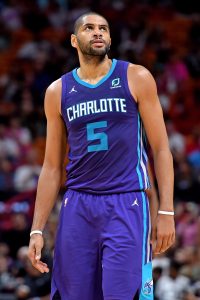
Non-Guaranteed Contracts:
Two-Way Contracts:
Free Agents:
2020 Draft Assets
First Round:
Second Round:
- No. 32 overall pick
- No. 56 overall pick
With the possible exception of the Timberwolves, the Hornets were the biggest beneficiary in this year’s draft lottery. They entered the evening with the eighth-best odds, but moved up to the No. 3 spot in the draft and will have an opportunity to select one of the top prospects in this year’s class.
In the second round, the Hornets traded away their own pick (No. 38), but had acquired picks from the Cavaliers and Celtics at Nos. 32 and 56, respectively.
Three Key Offseason Questions
1. What will the Hornets do with the No. 3 overall pick?
A number of the Hornets’ fellow lottery teams – including the Timberwolves and Hawks – have one or two rising young stars to build around. That’s not the case in Charlotte, where no current Hornets players have ever made an All-Star team or averaged 20+ PPG in a season.
Charlotte could badly use some star power, and jumping up to No. 3 in the draft puts the franchise in position to secure a player with All-Star potential. LaMelo Ball is widely considered by draft experts to be the player with the highest ceiling among this year’s prospects, and there are plausible scenarios in which he could slip to No. 3, with Anthony Edwards and James Wiseman in play for the first two draft slots.
The Hornets’ top two scorers in 2019/20 – Devonte’ Graham and Terry Rozier – are also guards, but president of basketball operations Mitch Kupchak has repeatedly stated that he won’t let positional considerations impact his pick in this year’s lottery. And Graham and Rozier don’t have the same level of upside that Ball does.
If Ball comes off the board before the Hornets pick, Kupchak could instead turn to Wiseman, an athletic seven-footer who remains a work in progress on both ends of the floor, but has big-time potential as both a scorer and a rim protector. If he develops as planned, Wiseman could be Charlotte’s long-term answer in the middle.
Since Ball, Wiseman, and Edwards are widely considered to be the top three prospects in this year’s class, some interesting trade opportunities may arise for the Hornets — a team that covets one of those top three prospects could be willing to put together a significant trade package to move up.
Still, it’s worth recalling that one of Kupchak’s first moves when he took control of the Hornets’ front office in 2018 was to trade down one spot in the draft from No. 11 to 12, clearing the way for the Clippers to take Shai Gilgeous-Alexander. Two years later, Gilgeous-Alexander is exactly the sort of rising star the Hornets could badly use, so Kupchak will be wary about missing out on a similar opportunity in 2020.
2. Will the Hornets be able to maximize their cap room on the trade market?
Kupchak has said multiple times in recent months that the Hornets don’t expect to be a major player in free agency this offseason. However, the team should still have in the neighborhood of $20MM in cap room — unless ownership doesn’t plan on spending to the league’s salary floor, that means the club will likely take advantage of its cap space on the trade market.
There are two directions the Hornets could go as they pursue trades. One would involve using their cap room to accommodate straight salary dumps in order to accumulate assets. The other would see them use their space to target a player who could become a long-term contributor.
Let’s run through both scenarios, starting with a potential salary dump. The idea here would be to take on unwanted salary along with a draft pick, allowing the Hornets’ trade partner to clear cap room of their own or avoid a pricey luxury tax bill. Last offseason, for instance, we saw the Grizzlies, Clippers, and Hawks acquire first-round picks for taking on Andre Iguodala, Maurice Harkless, and Allen Crabbe, respectively.
It’s a little too early to single out specific teams that could be willing to dump money to Charlotte this offseason, but a club like Philadelphia could fit the bill. The Sixers currently project to be a taxpayer in 2020/21 and have some exorbitant long-term contracts on their books. Maybe they’d be willing to give up a future first-round pick if the Hornets are willing to take on Al Horford‘s pricey multiyear deal in exchange for Cody Zeller‘s less expensive expiring contract.
On the other hand, the Hornets could single out specific players who would fit into their long-term plans and might be available via trade this offseason. Buddy Hield, Myles Turner, and Kelly Oubre are among the young, promising players who may be redundant on their current teams and could be nice fits in Charlotte.
Of course, in those examples, the Hornets would have to give up an asset or two of their own in a trade. If the ask is P.J. Washington or a future first-round pick, that might be a non-starter. But Charlotte could offer cap relief, Malik Monk, Cody Martin, second-round picks, or even a heavily-protected first-rounder — that might be enough to have a conversation about someone like Oubre.
3. Is a contract extension in play for Devonte’ Graham?
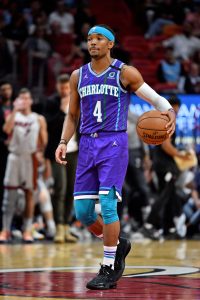 Graham’s breakout season in 2019/20 was one of the bright spots of the Hornets’ year and bodes well for the team’s developmental program. Graham – who averaged 18.2 PPG, 7.5 APG, and a .373 3PT% this season – is on a minimum-salary contract for one more year before becoming eligible for restricted free agency in 2021.
Graham’s breakout season in 2019/20 was one of the bright spots of the Hornets’ year and bodes well for the team’s developmental program. Graham – who averaged 18.2 PPG, 7.5 APG, and a .373 3PT% this season – is on a minimum-salary contract for one more year before becoming eligible for restricted free agency in 2021.
Rather than letting Graham play out that deal and risking him signing an expensive offer sheet next year, the Hornets may explore the possibility of a contract extension this offseason. It has now been more than two years since Graham originally signed with the club, so he’ll be extension-eligible throughout his contract year — a new deal signed this year would go into effect for the 2021/22 season.
Because he’s a minimum-salary player, Graham would be eligible for a starting salary worth up to 120% of the league’s estimated average salary. If the cap stays the same in 2020/21 as it was in ’19/20, that would translate to a maximum extension of $51.4MM over four years.
It’s possible Graham would rather bet on himself and try his luck in restricted free agency — that’s what Bogdan Bogdanovic did this past year when he received an identical extension offer from the Kings.
But Graham only really has a one-year track record so far. And unlike Bogdanovic, who made $8.5MM this season, he has only been a minimum-salary player since entering the NBA. A long-term deal worth nearly $13MM per year could sound awfully good to him, and it’s a pretty fair price for the Hornets, even if they don’t expect the 25-year-old to make another major leap within the next year or two.
Josh Richardson, Norman Powell, and Spencer Dinwiddie are among the players in recent years who have signed three- or four-year extensions worth 120% of the NBA’s average salary. I’d expect the Hornets to see whether Graham may want to follow suit this offseason.
Information from Basketball Insiders and ESPN was used in the creation of this post. Photos courtesy of USA Today Sports Images.
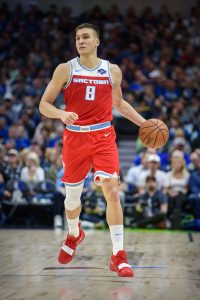
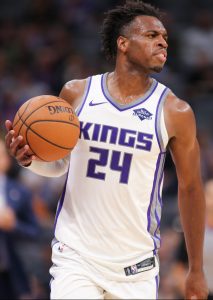 Hield’s new contract extension – which starts at nearly $25MM before declining in later seasons – will go into effect in 2020/21. Having already committed big money to Hield and
Hield’s new contract extension – which starts at nearly $25MM before declining in later seasons – will go into effect in 2020/21. Having already committed big money to Hield and 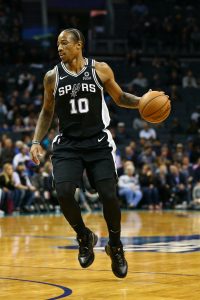
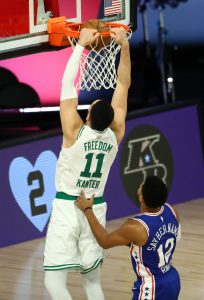
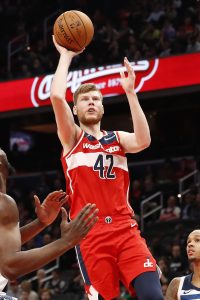
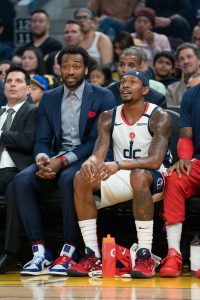

 Graham’s breakout season in 2019/20 was one of the bright spots of the Hornets’ year and bodes well for the team’s developmental program. Graham – who averaged 18.2 PPG, 7.5 APG, and a .373 3PT% this season – is on a minimum-salary contract for one more year before becoming eligible for restricted free agency in 2021.
Graham’s breakout season in 2019/20 was one of the bright spots of the Hornets’ year and bodes well for the team’s developmental program. Graham – who averaged 18.2 PPG, 7.5 APG, and a .373 3PT% this season – is on a minimum-salary contract for one more year before becoming eligible for restricted free agency in 2021.